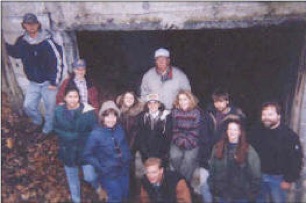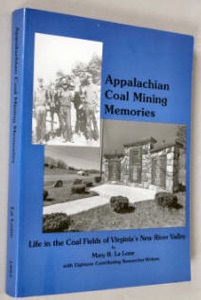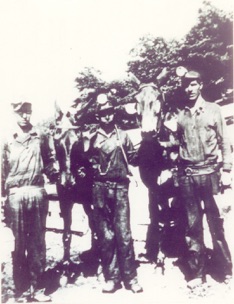The class design involved starting the semester with a series of orientation sessions to familiarize the students with the region's mining history and to build rapport between the academic research team and the members of the mining association. The orientation was followed by interviewing, transcription, and analysis on mining household strategies. The heritage group helped make initial contacts for the interviews, while the academic research team was responsible for conducting and taping the interviews, then transcribing tapes and doing content analysis as class activities. The urgency of collecting the interviews in this heritage preservation effort was the clear motivation to mining association members and students alike.
The project resulted in two volumes of oral histories. In 1997, we published Appalachian Coal Mining Memories, a collection of oral history interviews that documents mining life in the voices of the Appalachian people, along with the academics' ethnographic analysis of mining life. We continued the interviewing process in 1998 and produced a sequel volume of oral histories entitled Coal Mining Lives. The two volumes of oral histories together contain sixty-one interviews in which forty-three men and thirty women describe their lives as coal miners, miner's wives, and miner's children. They describe the labor and dangers of mining underground, and also portray the pride that miners developed in their work. They tell about the contributions of wives and children, and the livelihood strategies in which family members engaged in a wide variety of additional activities to supplement the mining income. They tell about the role of kin, community, and religion in providing social support and economic safety nets for families that fell on hard times.
Anthropology was put to work in a three-year oral history project that documented these first-hand memories at a critical time, before the elders with this knowledge passed away. In an applied effort, the project produced the interviews in book format so the data can be readily available for use in Appalachian heritage education.
Project Director/Professor: Dr. Mary LaLone
1995-6 Student Research Team:
Carol Adkins, Otis Jamie Bauguess, Jerusha Brooks, Elizabeth Franklin Bryant, Jane P. Delicate, Bryan Dilday, Lauren M. England, Alicia Gallant,
Parker Gillock, Stacie Spradlin Haynes, Kristen Hedrick, Mayumi Kurimoto, Sam L. Linkous, Jennifer Owings, Becky Prior, Alex Sweeney, Ren Talbott
1997 Student Research Team:
Kara S. Burchinal, Mary Beth Charlton, Rachael Eagan, Katherine Heflin, Dana Michelle Heizer, Christine Hicks, Tommy Hunt, David Joyner,
Heather McAllister, Kiera McReynolds, Michael J. Mirro, Barbara Talbert, Rob Whitney, Kumie Yagie
For Further Reading:
LaLone, Mary B.
1997 (ed.) Appalachian Coal Mining Memories: Life in Virginia's New River Valley Coal Fields. Blacksburg, VA: Pocahontas Press.
1997 "The Coal Mining Way of Life in Virginia's New River Valley: Hard Work, Family, and Community." The Smithfield Review 1:53-62, Spring.
1998 (ed.) Coal Mining Lives: An Oral History Sequel to Appalachian Coal Mining Memories. Radford, VA: Dept. of Sociology and Anthropology, Radford University.
1999 "Preserving Appalachian Heritage: A Model for Oral History Research and Teaching." Journal of Appalachian Studies 5(1):115-122.
2001 "Putting Anthropology to Work to Preserve Appalachian Heritage." In Practicing Anthropology 23(2):5-9, Spring 2001.
2005 "Building Heritage Partnerships: Working Together for Heritage Preservation and Local Tourism in Appalachia. Practicing Anthropology 27(4):10-13.
2007 "New River Valley Coal Mining Oral History Project." IN Case Studies in Community-Based Collaborative Research, The Institute for Community Research, June 2007, web publication http:///www.incommunityresearch.org/documents/CaseStudiesinCBCRFinal12.17.08.pdf. Pp. 10-13.
2009 "Guidelines for a Partnership Approach to Appalachian Community and Heritage Preservation Work." IN Participatory Development in Appalachia: Cultural Identity, Community, and Sustainability, Susan E. Keefe, ed. Knoxville: University of Tennessee Press. Pp. 201-229.






